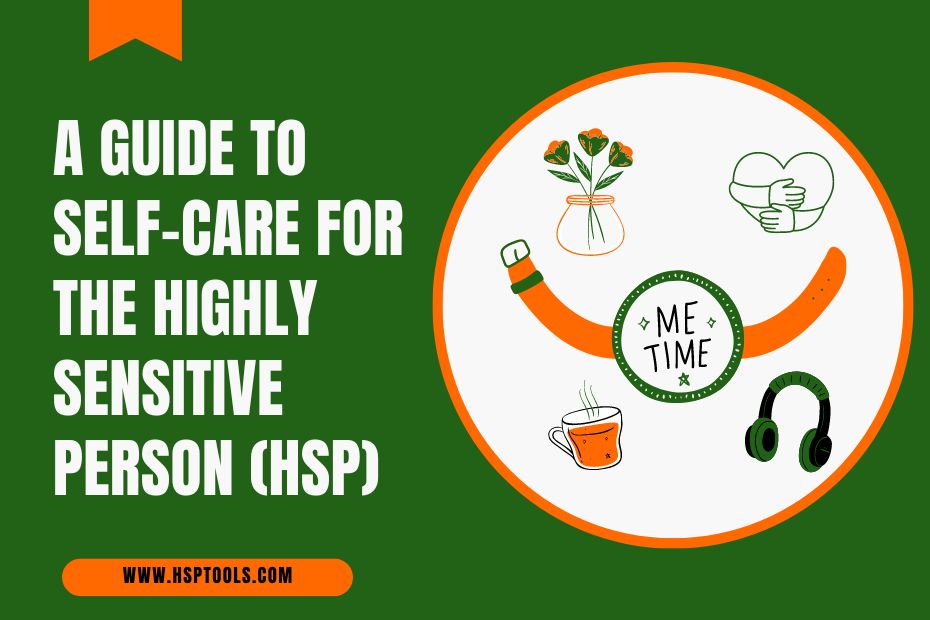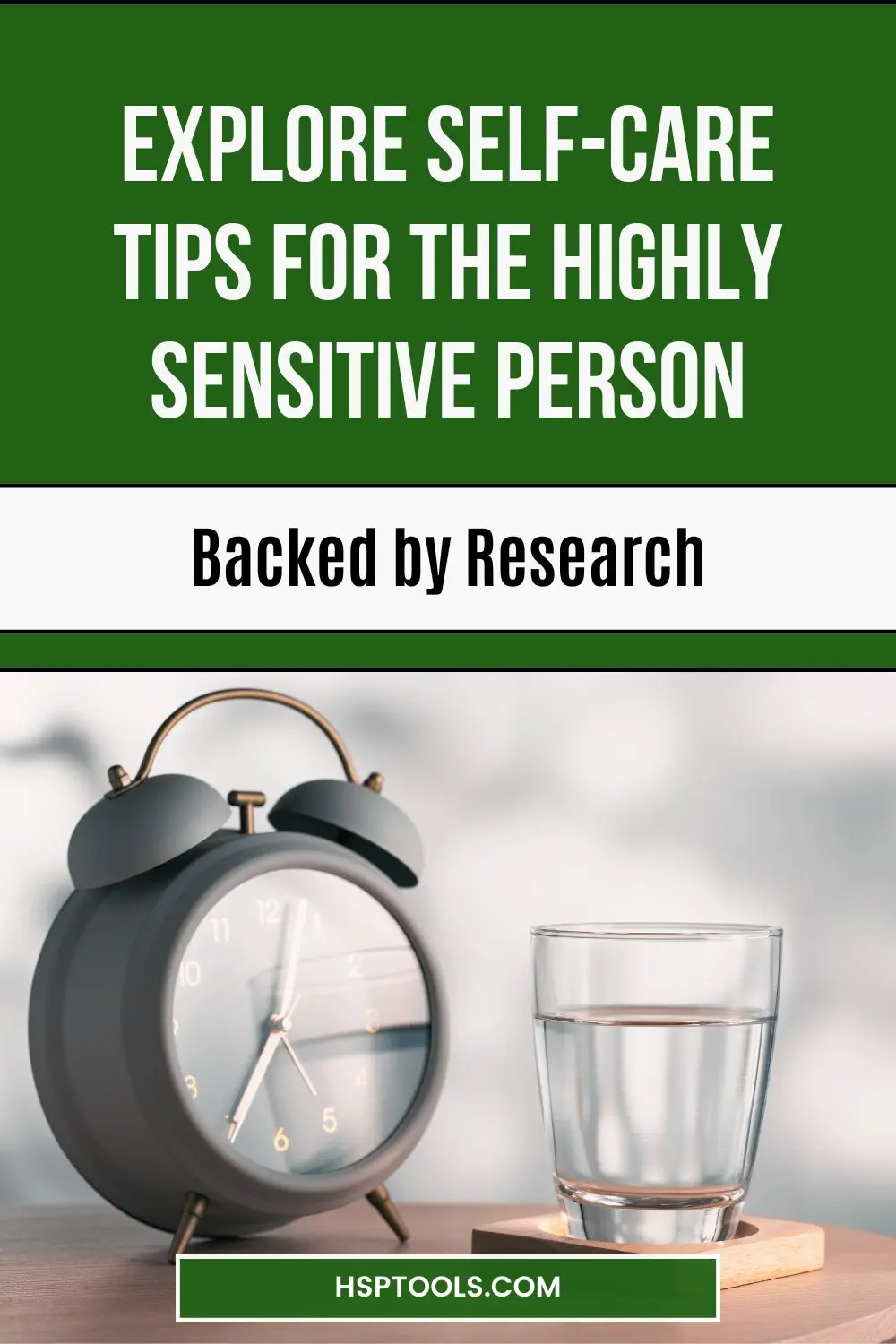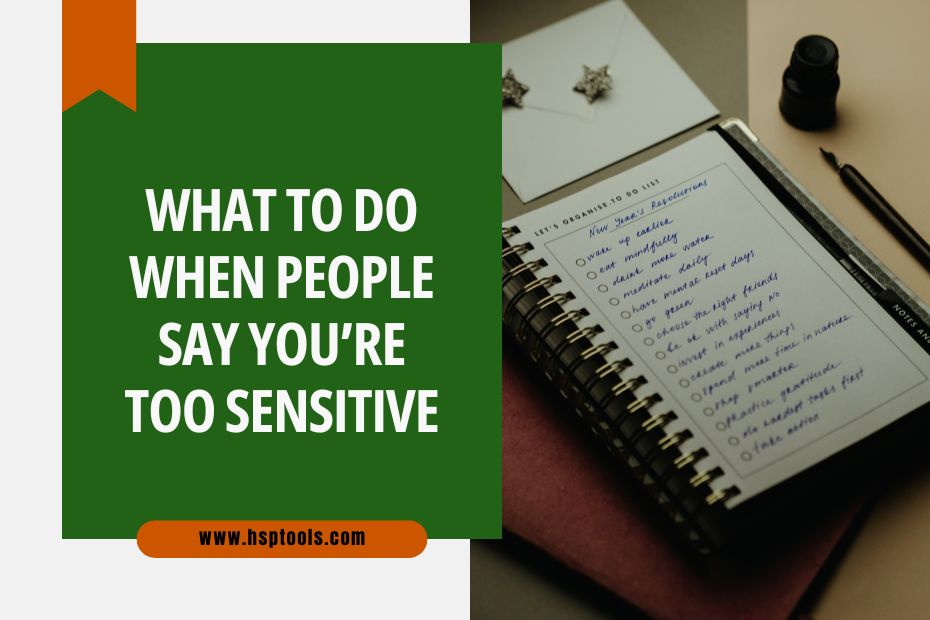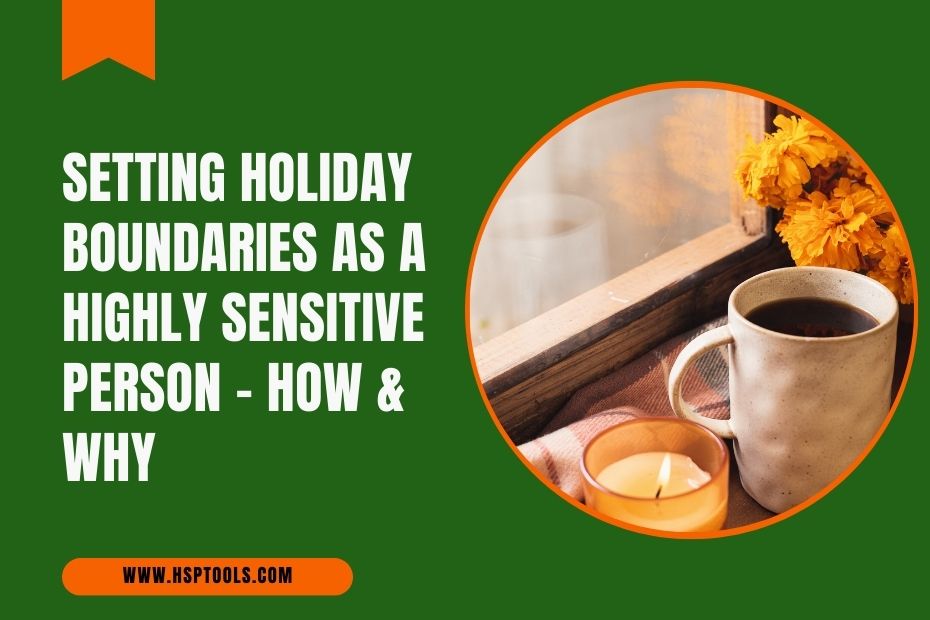17 Research-Backed Self-Care Tips for the Highly Sensitive Person (with examples)

Highly Sensitive People (HSPs) possess a trait known as Sensory Processing Sensitivity (SPS), which affects how they process sensory input, emotional stimuli, and environmental factors.
While this difference presents a unique opportunity for every Highly Sensitive Person (HSP), it also poses challenges such as overwhelm, overstimulation, anxiety, stress, and more.
And that’s why self-care is particularly crucial for HSPs.
In this comprehensive guide for the Highly Sensitive Person, discover research-backed self-care tips to manage your sensitivities with resilience and grace.

Understanding High Sensitivity
What is a Highly Sensitive Person?
A Highly Sensitive Person (HSP) is an individual with an increased sensitivity to external stimuli due to a personality trait known as Sensory Processing Sensitivity (SPS).
The trait, identified by Dr. Elaine Aron in the 1990s, is found in approximately 20-30% of the population.
SPS (also known as High Sensitivity) is characterized by deep cognitive processing, heightened emotional reactivity, and a tendency to become easily overwhelmed by sensory input.
Characteristics of HSPs
Summarized with the acronym DOES, Highly Sensitive People (HSPs) often exhibit the following traits:
- Depth of Processing: HSPs process information and experiences deeply, reflecting on their meanings and implications.
- Overstimulation: HSPs can quickly become overwhelmed by various sensory inputs, including bright lights, loud noises, strong smells, and crowded places.
- Emotional Reactivity & Empathy: HSPs react strongly to positive and negative events. They are also usually very empathetic and aware of others’ feelings.
- Sensing Subtleties: Highly Sensitive People (HSPs) tend to notice little details that others miss.
Supporting Research on High Sensitivity
A study by Aron and Aron (1997) found that HSPs exhibit heightened responsiveness to internal and external stimuli, which leads to increased emotional and sensory experiences.
Another study by Acevedo et al. (2014) used fMRI to demonstrate that Highly Sensitive People (HSPs) have increased activation in brain regions involved with awareness, empathy, and self-other processing.
Visit hsperson.com or sensitivityresearch.com websites to read more studies on High Sensitivity.
The Importance of Self-Care for HSPs
Research suggests regular self-care activities significantly reduce stress and improve mental health (Richardson and Rothstein 2008).
It also shows that leisure activities, a key component of self-care, are associated with lower cortisol levels, a stress marker (Pressman et al. (2009).
For Highly Sensitive People (HSPs), self-care is not merely a luxury but a necessity.
The constant intake of stimuli can lead to overstimulation, stress, and burnout if not managed effectively.
When this happens, HSPs can use different self-care practices to recharge, maintain emotional balance, and enhance their overall quality of life.
Below are some quick benefits of practising self-care as an HSP.
4 Benefits of Self-Care for HSPs
- Reduced Stress and Anxiety: Regular self-care practices can help manage stress and prevent anxiety.
- Improved Emotional Health: Self-care allows HSPs to process their emotions healthily, leading to better emotional regulation.
- Enhanced Physical Well-being: Proper self-care combats stress and improves emotional well-being, which results in better physical health.
- Increased Resilience: Many HSPs struggle with resilience, yet it’s a necessary skill in navigating life’s challenges. Luckily, self-care practices can contribute to an HSP’s ability to be resilient.
17 Research-Backed Self-Care Strategies for HSPs
1. Create a Soothing Environment
Numerous studies support the effects of one’s surroundings on their overall well-being.
For instance, this study found that exposure to natural environments, such as parks and gardens, reduces stress and promotes recovery from mental fatigue.
This other study by Kweon et al. (2008) demonstrated that access to natural light in work environments improves mood and productivity.
For Highly Sensitive People (HSPs), creating a calm and soothing space can make a big difference. Below are a few self-care ideas to get you started.
- Declutter and Organize: A tidy space reduces visual overstimulation and promotes a sense of calm.
- Use Calming Colors: Incorporate soft, muted colours in your home decor to create a serene atmosphere.
- Introduce Natural Elements: Plants, water features, and natural light can enhance the tranquillity of your space.
- Minimize Noise: Use noise-cancelling headphones or white noise machines to block out disruptive sounds.
2. Practice Mindfulness and Meditation
Mindfulness and meditation are powerful tools for managing overstimulation and emotional reactivity.
A meta-analysis by Grossman et al. (2004) found that mindfulness-based stress reduction (MBSR) programs significantly reduce symptoms of stress, anxiety, and depression.
Another study by Zeidan et al. (2010) demonstrated that brief mindfulness meditation improves mood and reduces fatigue.
Here are a few ways to incorporate mindful meditation into your HSP life.
- Mindful Breathing: Take a few minutes daily to focus on your breath. This simple practice can help ground you and reduce stress.
- Body Scan Meditation: This practice involves mentally scanning your body for areas of tension and consciously relaxing them.
- Guided Imagery: Learn to visualize a peaceful scene and use it to calm your mind and body.
- Regular Meditation: Establish a regular meditation routine to build resilience against stress and enhance emotional well-being. Use Insight Timer, Medito, Calm or Headspace if you require assistance.
3. Establish Healthy Boundaries
Research is clear that setting boundaries is essential for protecting your energy and well-being.
A study by Hunter et al. (2019) found that individuals who set clear boundaries experience lower stress levels and higher job satisfaction.
Another study by Brown and Ryan (2003) demonstrated that mindfulness, which often involves setting boundaries, is associated with increased well-being and emotional regulation.
As an HSP prioritizing self-care, here are four ways to practise setting boundaries.
- Learn to Say No: Understand that it’s okay to decline invitations or requests that overwhelm you.
- Limit Exposure to Overstimulating Environments: Avoid places or situations you know will be too stimulating.
- Communicate Your Needs: Clearly communicate your sensitivity to those around you so they understand your boundaries and needs.
- Take Breaks: Permit yourself to take breaks and retreat to a quiet space when necessary. Even better, block out time for rest in your daily schedule.
4. Prioritize Rest and Sleep
Sleep plays a critical role in an individual’s overall health, especially for Highly Sensitive People (HSPs) who require more time for rest and relaxation.
According to this research by Walker (2017), adequate sleep improves cognitive function, emotional regulation, and overall health.
Another study by Dinges et al. (1997) demonstrated that sleep deprivation negatively impacts mood, cognitive performance, and stress levels.
These self-care tips for HSPs will help you sleep better and feel more relaxed.
- Create a Relaxing Bedtime Routine: Engage in calming activities before bed, such as reading, taking a warm bath, or practising gentle yoga.
- Optimize Your Sleep Environment: Ensure your bedroom is warm, dark, and quiet to promote better sleep.
- Practice Good Sleep Hygiene: Maintain a consistent sleep schedule and avoid screens before bedtime.
- Listen to Your Body: Allow yourself to rest when you feel tired, even if it’s a short nap during the day.
5. Engage in Creative Outlets
Creative activities can be a therapeutic way for HSPs to express and process their emotions.
According to research by Kaimal et al. (2016), engaging in artistic activities reduces cortisol levels and promotes emotional well-being.
In another study by Konlaan et al. (2000), participation in cultural activities, such as visiting museums and attending concerts, is associated with lower mortality and improved health outcomes.
Here are self-care activities you can adopt as a Highly Sensitive Person.
- Art and Craft: Drawing, painting, knitting, or crafting can be relaxing and fulfilling for HSPs.
- Writing and Journaling: Writing about your experiences and feelings can help you process and understand your emotions.
- Music and Dance: Listening to or creating music and dancing can be an excellent way to release tension and uplift your mood.
- Gardening: Tending to plants can provide a sense of accomplishment and connection to nature.
6. Foster Supportive Relationships
Research emphasizes the importance of social support for living fully as a Highly Sensitive Person (HSP)
A study by Uchino (2004) found that social support is associated with lower levels of stress, improved immune function, and increased longevity.
Another study by Holt-Lunstad et al. (2010) demonstrated that strong social connections are linked to a 50% increased likelihood of survival.
Here are ways to build a network of supportive relationships as an HSP.
- Choose Your Circle Wisely: Surround yourself with people who understand and respect your sensitivity.
- Seek Out Fellow HSPs: Connecting with other HSPs can provide a sense of community and understanding.
- Communicate Openly: Practice open and honest communication in your relationships to avoid the weight of unmet needs.
- Seek Professional Support: Consider therapy or counselling to navigate challenges and develop coping strategies.
7. Nourish Your Body
A healthy diet can significantly impact your physical and emotional well-being.
According to Jacka et al. (2010), a diet high in fruits, vegetables, and whole grains is associated with a lower risk of depression.
Hydration is also crucial for cognitive function and mood regulation, according to this study by Benton (2008).
As a Highly Sensitive Person, here are self-care practices you can add to your day-to-day.
- Balanced Nutrition: Eat a balanced diet, prioritizing fruits, vegetables, lean proteins, and whole grains.
- Stay Hydrated: Drink plenty of water to stay hydrated and support overall health.
- Limit Stimulants: Reduce intake of caffeine and sugar, which can exacerbate anxiety and overstimulation.
- Practice Mindful Eating: Savour each bite and watch your body’s hunger and fullness cues. Try to eat only when you’re hungry and stop eating when you feel full.
8. Engage in Regular Physical Activity
Exercise is a natural stress reliever and can help you manage your sensitivities.
Research supports this statement with Deslandes et al. (2009) finding that regular exercise improves mood, reduces anxiety, and enhances cognitive function.
Another study by Li et al. (2010) confirms that spending time in nature reduces stress and promotes emotional well-being.
To leverage these exercise benefits, below are some self-care practices to incorporate.
- Focus on Gentle Activities: Engage in gentle activities such as walking, yoga, or tai chi, which can help reduce stress without overwhelming your nervous system.
- Take Nature Walks: Spending time in nature can be incredibly soothing for Highly Sensitive People (HSPs).
- Create a Routine Exercise: Come up with a regular exercise routine that you enjoy and that fits your lifestyle.
- Listen to Your Body: Pay attention to your body’s signals and avoid pushing yourself too hard.
9. Limit Media Consumption
Research indicates that excessive media consumption can negatively impact mental health.
A study by Holman et al. (2014), for example, found that prolonged exposure to media coverage of traumatic events increases stress and anxiety.
Another study by Rosen et al. (2013) demonstrated that frequent use of social media is associated with higher levels of anxiety and depression.
As a Highly Sensitive Person (HSP), you will agree that the constant stream of information and stimuli from the media can be overwhelming for HSPs.
Below are a few self-care strategies to limit media consumption and manage overwhelm.
- Curate Your Content: Choose media that is uplifting and avoid content that is excessively violent or distressing.
- Set Boundaries: Limit the time you spend consuming news and social media. Come up with specific scrolling hours and stick to them.
- Go on a Digital Detox: Regularly take breaks from screens and digital devices to recharge.
- Practise Mindful Consumption: Be mindful of how media consumption affects your mood and adjust your intake as needed.
10. Practice Self-Compassion
Self-compassion is essential for HSPs who may often feel overwhelmed or misunderstood, which, to be honest, is most of us.
According to research by Neff et al. (2007), lack of or low self-compassion is associated with lower levels of anxiety and depression.
Another study by Gilbert et al. (2011) demonstrates that self-compassion enhances emotional resilience and well-being.
If you’re among the many HSPs struggling to be self-compassionate, below are a few self-care tips that can help.
- Be Kind to Yourself: In the same way you offer kindness to others, treat yourself with the same kind gesture and understanding.
- Acknowledge Your Strengths: Recognize the unique strengths of being Highly Sensitive, such as empathy, creativity, and deep insight.
- Forgive Yourself: Let go of self-criticism and forgive yourself for any perceived shortcomings.
- Celebrate Your Sensitivity: Learn to embrace your sensitivity as a valuable part of who you are and find ways to celebrate it.
11. Embrace Solitude
Research highlights the benefits of practising solitude for mental health and overall well-being.
A study by Nguyen et al. (2018) found that spending time alone enhances self-reflection and emotional regulation, while another study by Leary et al. (2003) demonstrated that solitude can reduce stress and improve overall well-being.
For Highly Sensitive People (HSPs), solitude can be a powerful tool for recharging and processing thoughts and emotions.
Below are a few self-care ideas to help you incorporate solitude into your life.
- Scheduled Alone Time: Dedicate specific times each day or week to be alone, allowing yourself to decompress and rejuvenate.
- Quiet Reflection: Use this time for quiet reflection, meditation, or simply being with your thoughts without distractions.
- Solitary Activities: Engage in enjoyable solitary activities, such as reading, writing, or listening to music.
- Nature Retreats: Consider occasional retreats to nature, where you can immerse yourself in a peaceful environment away from everyday stressors.
12. Manage Sensory Overload
HSPs are particularly susceptible to sensory overload, which can lead to fatigue and irritability.
According to a study by Engel-Yeger and Dunn (2011), individuals with Sensory Processing Sensitivity (SPS) benefit from environments that reduce sensory overload.
The self-care tools below can help you manage sensory input and avoid or reduce overload.
- Sensory-Friendly Clothing: Wear comfortable, non-restrictive clothing that feels good against your skin.
- Adjust Lighting: Use lamps or light fixtures with adjustable brightness to create a soothing atmosphere.
- Aromatherapy: Research by Brown et al. (2001) suggests that aromatherapy with essential oils reduces stress and improves mood. Use essential oils or natural scents to create a calming environment. Lavender, chamomile, and sandalwood are known for their relaxing properties.
- Earplugs and Eye Masks: Use earplugs or eye masks to block out excessive noise and light, especially when resting or sleeping.
13. Develop a Routine
Research shows that structured routines provide a sense of predictability and control, reducing stress (Hobfoll 2002).
It also suggests that daily routines are associated with lower levels of anxiety and depression (Branstrom et al. 2010).
As a Highly Sensitive Person (HSP), having a consistent routine can provide stability and predictability, reducing anxiety and overstimulation.
Use the self-care ideas below to establish a routine that works for you.
- Create a Daily Schedule: Schedules provide structure, and structures are crucial to helping HSPs thrive. Develop a plan that includes time for work, rest, and leisure activities.
- Establish Rituals and Habits: Think of comforting rituals and habits that bring you a sense of control, and practise them daily. It could be an activity as easy as a 15-minute walk after lunch.
- Follow a Morning Routine: Start your day with a calming morning routine that sets a positive tone, such as meditation, gentle stretching, or a healthy breakfast.
- Practise Evening Wind-Down: End your day with an evening routine that helps you unwind, such as reading, journaling, or taking a warm bath.
14. Seek Out Positive Stimulation
While avoiding overstimulation is crucial, HSPs benefit from positive and enriching experiences that nourish their sensitivity.
A study by Fredrickson and Joiner (2002) found that positive emotions broaden attention and thinking, enhancing psychological resilience.
Another study by Emmons and McCullough (2003) demonstrated that gratitude practices improve well-being and mental health.
As a Highly Sensitive Person, here are self-care activities you can use to stimulate positivity and unlock your HSP strengths.
- Art and Culture: Visit museums, galleries, or cultural events that inspire and uplift you.
- Meaningful Conversations: Engage in deep and meaningful conversations with friends or loved ones.
- Learning and Growth: Pursue interests and hobbies that stimulate your mind and allow you to learn and grow.
- Practise Gratitude: Regularly engage in gratitude activities by acknowledging and appreciating the positive aspects of your life.
15. Practice Emotional Regulation
HSPs often experience intense emotions, making emotional regulation an essential aspect of self-care.
According to a study by Gross (2002), effective emotional regulation strategies reduce stress and enhance well-being.
Another study by Linehan (1993) demonstrated that dialectical behaviour therapy (DBT), featuring emotional regulation techniques, improves emotional and psychological health.
Below are a few self-care tips to help you regulate emotions as a Highly Sensitive Person (HSP).
- Identify Triggers: Pay attention to what triggers your emotional responses and develop strategies to manage them.
- Express Emotions: Find healthy outlets to express your emotions, such as talking to a friend, journaling, or engaging in creative activities.
- Mindfulness Techniques: Use mindfulness techniques to stay present and reduce emotional reactivity.
- Therapy and Counseling: Consider seeking professional help to develop emotional regulation skills and strategies.
16. Foster a Supportive Work Environment
A study by Karasek and Theorell (1990) found that job control and social support reduce stress and improve job satisfaction.
Another study by Bakker et al. (2005) demonstrated that a positive work environment enhances employee well-being and productivity.
For Highly Sensitive People (HSPs), creating a supportive and accommodating work environment is essential to thriving in an overwhelming world.
Here are a few ideas to help you spruce your work environment and improve productivity.
- Create an Ergonomic Workspace: Ensure your workspace is comfortable and ergonomically designed to reduce physical strain.
- Schedule Breaks and Downtime: Take regular breaks to rest and recharge during the workday.
- Request Flexible Work Arrangements: If possible, arrange flexible work hours or remote work to manage your sensitivity better.
- Learn to Communicate Your Needs: HSPs have unique needs that others may find complicated or inconsequential. Communicate these needs to your employer or colleagues to create a more understanding and supportive work environment.
17. Embrace Your Sensitivity
A study by Neff and Vonk (2009) found that self-acceptance is associated with higher self-esteem and lower levels of anxiety and depression.
Another study by Seligman et al. (2005) demonstrated that self-acceptance practices enhance well-being and life satisfaction.
When Highly Sensitive People (HSPs) learn to embrace and celebrate their sensitivity for the unique strengths it offers, they open up their lives to endless opportunities.
Below are a few tips to help you start embracing your High Sensitivity and embark on a journey to thriving as an HSP.
- Self-Acceptance: Practice self-acceptance and recognize that your sensitivity is a strength, not a weakness.
- Find Role Models: Look for role models who are also HSPs and draw inspiration from their experiences and achievements.
- Educate Others: Educate those around you about High Sensitivity to foster greater understanding and support.
- Prioritize Personal Growth: Use your sensitivity as a tool for personal growth, self-discovery, and connecting with others on a deeper level.
Final Word on Self-Care Tips for HSPs
Self-care for the Highly Sensitive Person is not a one-size-fits-all approach. It’s a personalized practice that evolves with time, changing needs, and experience.
The self-care strategies, tips, and ideas in this guide for Highly Sensitive People (HSPs) will help you learn to navigate your sensitivities more healthily and with less overwhelm.
But not all practices will work for you.
Pick the options that feel right to you and use them to create a personalized self-care strategy that lets you harness your HSP trait as a strength.
P.S.: Always remember that being a Highly Sensitive Person is not a flaw but a unique trait with strengths and challenges.
By embracing your sensitivity, practising self-compassion, and creating a self-care routine that nurtures your mind, body, and spirit, you can learn to thrive.
More Self-Care Related Posts
- Looking for a Self-Care Planner for 2024? You Might Like This One by Self-Love Rainbow!
- 8 Mental Health Resources by Self-Love Rainbow Perfect for Highly Sensitive People
- 15 Therapist-Approved Tools to Help You Thrive in an Overwhelming World
- How to Navigate Sensory Overload as a Highly Sensitive Person (A Beginner’s Guide)








